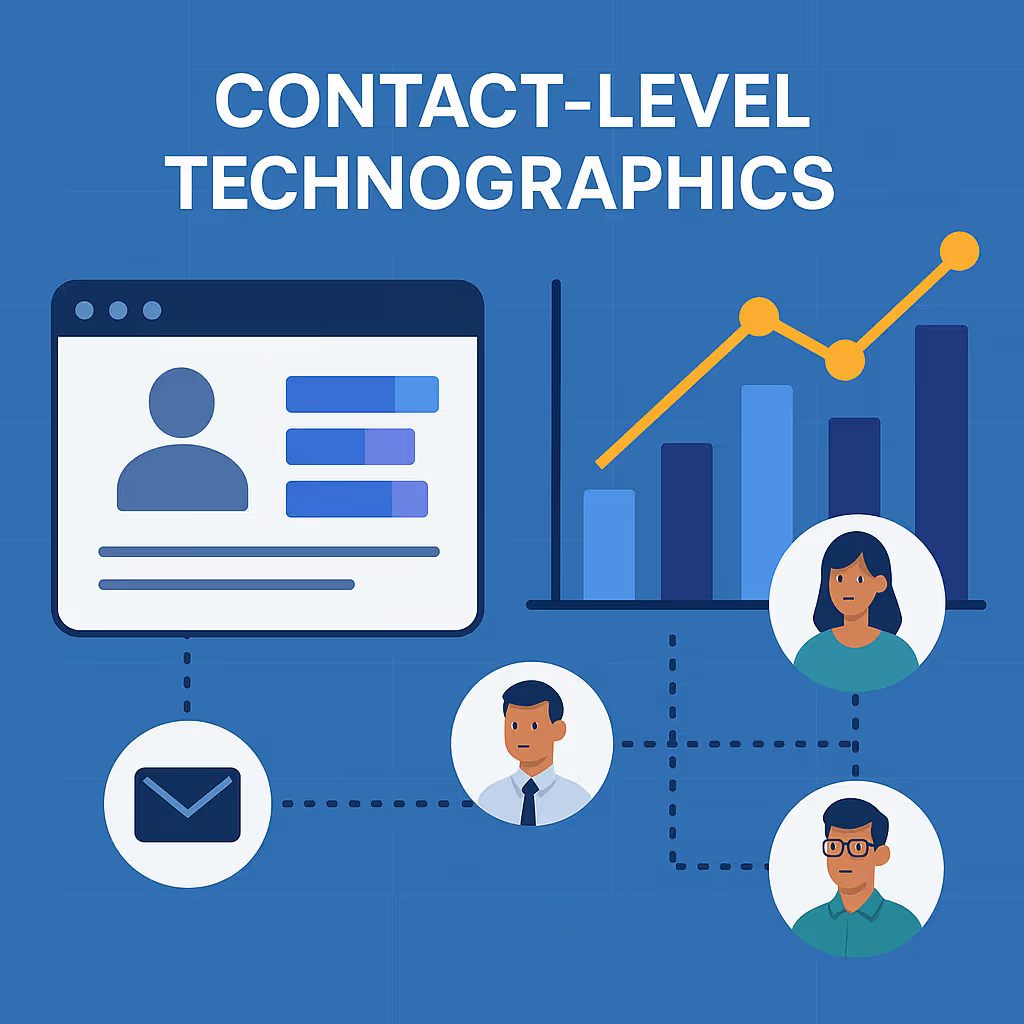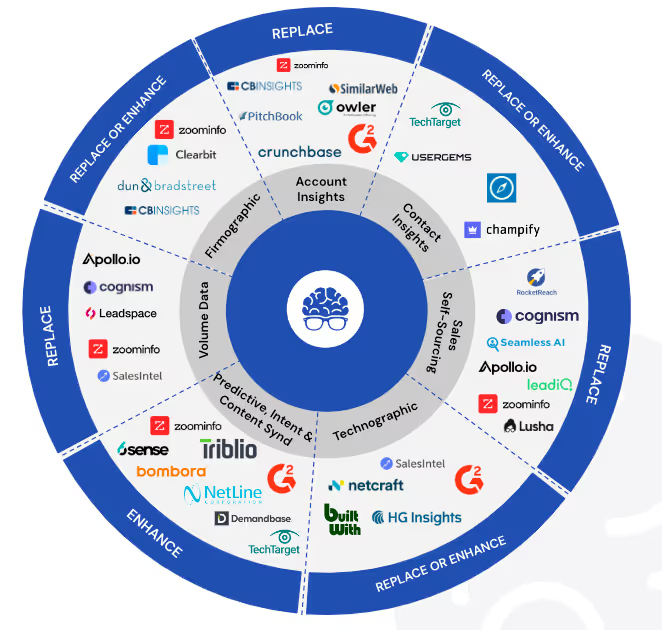In the competitive SaaS landscape, targeting SMBs is akin to a modern-day treasure hunt across a digital sea of opportunities. The challenge? Identifying the right SMBs among a vast and diverse market. The solution? The revolutionary trio of Artificial Intelligence (AI), Large Language Models (LLMs), and Machine Learning (ML). These technologies equip SaaS companies with the advanced capabilities needed to precisely identify and engage with high-value SMB prospects.
Traditionally, connecting with the ideal SMBs has been a daunting task for SaaS businesses, often compared to finding a needle in a haystack. Now, AI and related technologies are changing the game. They enable SaaS providers to sift through extensive digital data, from social media engagements to online behaviors, to uncover valuable insights about potential clients. This process goes beyond mere automation or efficiency. It's about gaining a deeper, more nuanced understanding of SMB needs and readiness for SaaS solutions.
AI and ML stand out by filtering through digital noise to highlight actionable signals, allowing SaaS businesses to navigate the SMB market with an unprecedented edge. Furthermore, these technologies redefine customer engagement, facilitating personalized, targeted, and impactful interactions that resonate with SMBs.
The advent of AI, LLMs, and ML marks not just a technological advance but a strategic shift in how SaaS companies approach the SMB market. This shift towards a more informed, sophisticated, and technology-driven strategy recognizes the unique challenges of the SMB sector and capitalizes on the power of AI to meet them. As we embark on this technological revolution, it's clear that companies embracing these innovations are setting themselves up to lead in the SaaS industry.
Against the backdrop of the SaaS industry's quest to unlock the SMB market—a segment both vast and crucially underserved—the limitations of traditional data collection methods become starkly apparent. While large enterprises often command attention with their sizeable needs and budgets, it's the small and medium-sized businesses (SMBs) that form the economy's backbone. These entities account for over 99.9% of US businesses and are instrumental in job creation, driving innovation and fostering economic diversity. However, their heterogeneity and volume pose a formidable challenge for SaaS companies attempting to penetrate this market.
Traditional approaches to data collection, heavily reliant on structured data, prove inadequate when faced with the rich, varied tapestry of the SMB sector. The standard metrics and databases often overlook the vibrant, unstructured data—social media interactions, forum discussions, customer reviews—that paint a fuller picture of an SMB's operations, challenges, and needs. This gap in understanding means that SaaS providers may miss out on engaging with SMBs that could significantly benefit from their services, or worse, expend resources pursuing leads that aren't the right fit.
The diversity within the SMB segment is not just a matter of size or revenue but extends to the industries served, geographic locations, and the digital maturity of these businesses. A one-size-fits-all approach, common in strategies targeting larger enterprises, falls flat in the nuanced SMB landscape. Each SMB has its unique journey, influenced by its sector's specific challenges, growth stage, and the owner's vision. Capturing this diversity requires a shift towards more dynamic, intelligent methods of data collection and analysis.
Recognizing the limitations of traditional methods, innovative SaaS companies are now turning to AI, LLMs, and ML to bridge the gap. These technologies offer the ability to mine unstructured data for insights, predict trends, and identify patterns that human analysts might miss. By tapping into the vast stores of digital data that SMBs unknowingly generate, AI-driven tools can help SaaS companies not just identify potential SMB clients but understand them: their pain points, aspirations, and readiness for digital transformation.
In essence, the shift to leveraging AI and related technologies for SMB engagement is not just a technological upgrade but a strategic necessity. It allows SaaS companies to navigate the complexity of the SMB market with agility and precision, ensuring that their outreach efforts are both effective and efficient. As SaaS providers evolve to meet the needs of this critical segment, the tools and strategies they employ will undoubtedly redefine the landscape of business software solutions, making them more accessible, relevant, and impactful for the SMBs that power the economy.
The AI and LLM Revolution
The revolution brought about by Artificial Intelligence (AI) and Large Language Models (LLMs) is transforming the landscape for SaaS businesses targeting the SMB sector. These cutting-edge technologies have become indispensable assets, providing the ability to delve deep into the extensive, often chaotic digital traces left by SMBs on the internet. From the flurry of social media conversations to the spread of news articles and the subtleties of online behavior, AI and LLMs decode this complex web of information with remarkable precision.
This analytical prowess is not just about gathering data; it's about making sense of the noise. AI and LLMs filter, analyze, and interpret the digital signals emitted by SMBs, providing insights that were previously inaccessible. They identify patterns, trends, and signals that indicate an SMB's readiness and need for SaaS solutions, offering a level of understanding that goes beyond surface-level interactions.
For SaaS companies, this means the ability to strategically target SMBs that are not just in need of their offerings but are at a pivotal stage in their growth trajectory where these solutions can have the most impact. It opens up opportunities for tailored, highly effective engagement strategies that resonate with the unique needs and challenges of each SMB. This targeted approach leads to more meaningful connections, fostering relationships with businesses that are primed to benefit from what SaaS solutions have to offer.
Moreover, the AI and LLM revolution is setting new standards for efficiency and effectiveness in the SaaS domain. By automating the labor-intensive process of sifting through digital content, these technologies allow SaaS companies to allocate their resources more strategically, focusing their efforts on high-potential leads. This not only accelerates the sales cycle but also enhances the overall customer experience, laying the groundwork for lasting business relationships.
In essence, the integration of AI and LLM technologies marks a significant evolution in how SaaS companies approach the SMB market. It represents a shift towards more intelligent, data-driven strategies that promise to redefine the future of SaaS marketing and sales, ensuring that companies can navigate the SMB terrain with unprecedented insight and agility.
Identifying the Diamonds in the Rough
SaaS sales and marketing teams are leveraging AI to cut through the noise and focus on SMBs that represent the best fit for their solutions. This involves monitoring key signals and activities online that indicate a potential match, such as:
- New product or service launches that may require the SaaS solution
- Hiring trends that suggest expansion and growth
- Public sentiment and social media activity that offer insights into the company's challenges and needs
This targeted approach enables SaaS companies to engage with SMBs more meaningfully, offering solutions that are timely and relevant.
Transforming Sales and Marketing Efficiency
The use of AI and LLMs in targeting SMBs offers a multitude of benefits for SaaS companies, including:
- Increased Sales and Marketing Efficiency: By focusing efforts on high-potential SMBs, SaaS companies can improve their conversion rates and reduce the cost of customer acquisition.
- Faster Lead-to-Customer Conversion: Real-time insights enable SaaS companies to engage with SMBs at the right moment, speeding up the sales cycle.
- Enhanced Customer Lifetime Value (LTV): A better fit between the SaaS solution and the SMB's needs leads to longer, more profitable customer relationships.
- Lower Risk Profiles: AI and LLMs help identify SMBs with the strongest growth potential and stability, reducing the risk of churn.
- More Process Automation Efficiency: Automating the lead identification and qualification process allows sales teams to spend more time on engagement and relationship building.
Conclusion
For SaaS companies targeting the SMB market, AI and LLM technologies offer a path to uncover the hidden gems among a vast and varied landscape. By enabling a more focused, efficient, and informed approach to sales and marketing, these technologies are not just solving the challenge of identifying the right SMB prospects; they're fundamentally changing the game. In a sector where understanding and agility are key, AI and LLMs are providing the insights and capabilities necessary to thrive.




